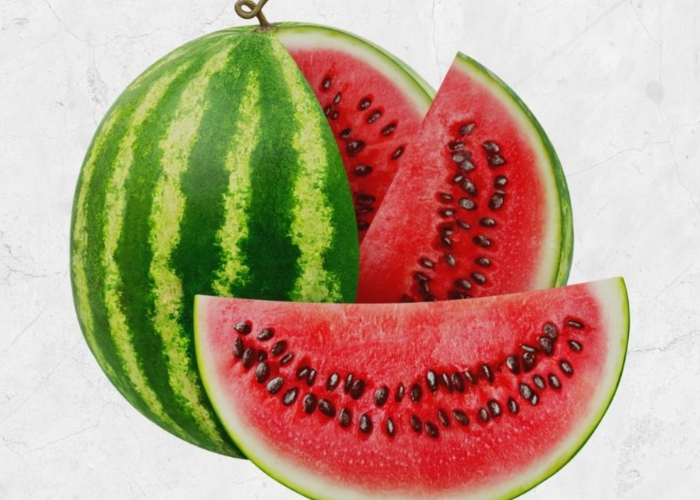Watermelons are undoubtedly one of the most popular summer fruits, known for their sweet and juicy flesh. From picnics to barbecues, watermelon is a must-have for any summer event. But have you ever wondered how much the average watermelon weighs?
Watermelon Origins
The watermelon is a truly remarkable fruit, with origins stretching far back in time. It is thought to have originated in the Kalahari Desert of Africa, where wild varieties of watermelon still grow today.
It is believed to have been cultivated by the ancient Egyptians as early as the 2nd millennium BC, where it was used as both food and medicine. Watermelon is a member of the Cucurbitaceae family, which also includes squash, cucumber, and melons.
It is an annual plant, producing large, edible fruits with a hard green rind and juicy, sweet, red flesh. The average watermelon weighs between 5-7 pounds, but some varieties can weigh up to 30 pounds.
Watermelons are a refreshing and nutritious summertime snack and are packed with Vitamin A, Vitamin C, and potassium. They are also a great source of lycopene, a powerful antioxidant. Watermelon is a great addition to any summertime meal and can be enjoyed in a variety of ways.
Average Weight of a Watermelon
The average weight of a watermelon is an interesting statistic, as it can vary greatly depending on many factors. Generally, the average watermelon weighs between 5 and 15 pounds. The size of the watermelon is determined by how much water and sugar it contains, as well as the variety of the melon.
The variety of watermelon can affect its size, ranging from a small 2-3 pound fruit to a much larger 15-20 pound melon. The smaller watermelons are usually sweeter and juicier than the larger ones, however, the larger watermelons tend to have more flesh and are usually preferred when making watermelon-based dishes.
Additionally, the amount of water a watermelon contains affects its weight. A watermelon with higher water content will be lighter in weight than a watermelon with lower water content.
Factors Contributing to the Weight of Watermelons
The average weight of watermelons depends on a variety of factors, including the size of the watermelon, the variety of watermelons, and the climate it was grown in. Generally, watermelons can range anywhere from 5-25 pounds, with smaller watermelons usually being around 5-10 pounds, and larger watermelons being up to 25 pounds.
The variety of watermelons can also play a role in the weight of a watermelon. For example, seedless watermelons tend to be smaller and weigh less than seeded varieties. Additionally, the climate in which the watermelon is grown can influence its weight.
Warmer climates tend to produce larger, heavier watermelons, while cooler climates tend to have smaller, lighter watermelons. All of these factors combined can affect how much the average watermelon weighs.
Factors Affecting Weight
There are several factors that affect the weight of an average watermelon, such as the size, variety, and environmental conditions of the watermelon. The larger the watermelon, the heavier it will typically be.
A large watermelon can easily weigh more than 50 pounds, while a smaller watermelon may only weigh around 10 pounds. Variety also plays a role in the weight of a watermelon. Some varieties are known to be larger and heavier than others.
Finally, environmental conditions can affect the weight of a watermelon. If a watermelon is grown in a hotter climate, it is likely to be larger and heavier than a watermelon grown in a cooler climate.
Overall, the average watermelon can weigh anywhere from 5-50 pounds, depending on the size, variety, and environmental conditions.
Nutritional Value of Watermelon
Watermelon is a delicious summer fruit with an abundance of nutritional value. The average watermelon weighs between 5 and 18 pounds, depending on the variety. Watermelons are an excellent source of vitamins A and C, as well as calcium, magnesium, and potassium.
They are also high in fiber and antioxidants, which help to boost your immune system and reduce inflammation in the body. Watermelon is a low-calorie and low-fat food, making it a great choice for those trying to maintain a healthy weight. Watermelon also contains lycopene, which is believed to reduce the risk of some cancers.
Eating watermelon can help to hydrate your body and provide essential vitamins and minerals that are important for overall health. So, when you’re looking to enjoy a delicious snack that is packed with health benefits, make sure to include watermelon on your list.
Growing Your Own Watermelons
Growing your own watermelons has become a popular hobby among gardeners. Watermelons are large, juicy fruits that can weigh anywhere from 5 to 25 pounds. The average watermelon weighs around 10-15 pounds, but this can vary depending on the variety and size of the melon.
When growing your own watermelons, it is important to choose varieties that are suitable for your climate and soil type. Planting several different varieties will give you the best chance of finding one that is well-suited to your garden and will produce good-sized watermelons.
When choosing watermelon seedlings from a garden center, look for melons with a smooth, dark-green rind and a dull thump when tapped. The weight of a watermelon can also be an indication of its sweetness and flavor; the larger the melon, the sweeter it will be.
Benefits of Eating Watermelon
The benefits of eating watermelon are numerous. Not only is watermelon a delicious and refreshing fruit, but it is also incredibly nutritious. One of the most significant benefits of eating watermelon is its weight.
On average, a typical medium-sized watermelon can weigh anywhere between 6 to 18 pounds! Eating watermelon is a great way to get your daily dose of vitamins and minerals, such as vitamin A, vitamin C, potassium, magnesium, and iron, without feeling overly full.
Additionally, watermelon is composed of 92% water, making it a great source of hydration, as well as a healthy snack for those who are trying to watch their calorie intake.
Conclusion
The average weight of a watermelon varies depending on the size of the fruit and the type of watermelon. Generally, small watermelons weigh around four to five pounds, while large watermelons can weigh up to 25 pounds.
Watermelons also vary in shape, size, and color, so it is important to select the right watermelon for your needs. In general, smaller watermelons are ideal for a single serving, while larger watermelons can be shared between multiple people. By understanding the average weight of watermelons, you can make sure you purchase the right size for your needs.





